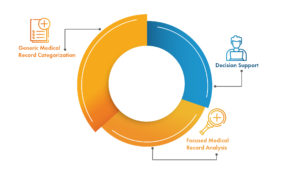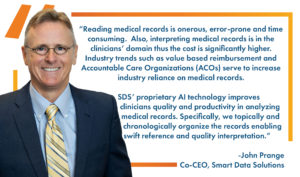Finding more efficient ways to process and transfer information is one of the main hallmarks of technology. From the printing press to the internet, the transfer of information has continually evolved to be easier, faster, and more automated.
There’s no doubt that we’re living in a golden age of technology with the ability to send and receive information anywhere and at any time. In the medical industry and adjacent fields, this has become a game-changer, as medical records can be shipped quickly without the need for paper copies or even human intervention.
Increasing Need for Payers to Receive Medical Records
Despite the progress and ease of use that many administrative healthcare companies are experiencing, there are still problems that plague Providers and Payers alike. Payers especially are finding themselves with more medical records than ever before. These records are being sent to Payers to settle disputes, ensure coverage, and pre-authorize coverage along with a myriad of other insurance-specific reasons.
Payers have now found themselves in a somewhat odd position: they need to be able to accept nearly any form type and simultaneously transform that data into a workflow-friendly file format. With so many different institutions using disparate software, this can become a real problem for efficiently responding to claims and other inquiries. This isn’t a situation that can be “waited out” either. Certain records change so frequently that they are difficult to properly standardize.
Delays in response because of incompatible file formats seem trivial, but anyone in the industry knows that these can have real impacts on people waiting for a claim to be approved and adjudicated. Payers need to respond quickly and accurately — no matter what kind of medical file they take in or in what format.
As Payers are receiving more medical records, analyzing documents using machine learning and automation helps process bulk files faster. Payers won’t always have this technology in-house but can achieve immediate benefits when partnering with a healthcare technology partner.
Smart Data Solutions (SDS) has the software and support for custom APIs and machine learning to tailor workflows for any client’s needs. Specifically, we can help your organization with generic medical record categorization, focused medical record analysis, and decision support.
Put These 3 Pain Points to Rest
Three main pain points are familiar to every Payer that commonly handles medical records.
1. Having disparate file types come in while trying to apply a standard methodology of parsing data is a feat. While out-of-the-box software is well-suited for major file types, it can struggle with file types in the minority. These medical records still need the same prioritization as others, but are now stuck in a manual review process that slows turnaround times, has a high cost as skilled labor is required, and potentially leaves them out of compliance.
2. Compliance is pain point number two. Individual states set their own regulations and strict requirements for how medical records are handled and, more specifically, how organizations should respond to them and in what timeframe. Even if a Payer receives a lengthy record or a record with an obscure file format, they are required to process the information in the same timeframe as a simple file. Data from these records need to be extracted, processed, and plugged in without missing a beat. This is where customized machine learning and AI solutions shine. These technologies allow for critical data to be integrated into the proper workflows so that claims can meet or exceed their legal requirements.
3. Finally, Payers can often be overwhelmed with the sheer volume of documents. When you couple this large influx with the density of information contained in them, it can lead to delays, inaccurate or incomplete data, and general frustration among staff. Thankfully, with machine learning, synthesizing this data is easier than ever and allows Payers to stay on top of their commitments.
Machine Learning Alleviation
Using human power to process all the information that’s routed to Payers would be untenable today. Computers, however, accurately record and report the information they set out to collect without tiring, so long as it lands within their requirements. SDS’ machine learning and integration abilities help process information in three ways.

Generic Medical Record Categorization
Generic medical record categorization covers the essentials of each record that is routed to your company. These can be things like the date of service, admission/discharge date, physician orders, medications administered, and go as far as the social worker or case manager. These key points allow critical data to be obtained and categorized no matter the file type.
Focused Medical Record Analysis
After this process, SDS implements machine learning such as tokenization and stop word removal to analyze documents instantly.
Tokenization splits the document into smaller “tokens” which allows proper routing or other actions if qualifying information is discovered on a record.
In the same vein, stop word removal purges unnecessary data from documents allowing for greater search functionality. This list of stop words can be customized so that records can be sorted with greater efficiency and properly routed.
Decision Support
Decision support allows SDS to do the heavy lifting. By learning your common approval or disapproval scenarios, our machines can remember key things to look for, determine if the record should be approved or disapproved, and reduce the need for manual intervention by your clinicians. All of this will reduce both the cost and turnaround times associated with the process.

SDS Helps Payers Process Medical Records Faster
SDS has the software and in-house tech support for custom APIs and machine learning to help Payers analyze medical records faster and with less manual effort.
Our in-house technologists bring 20+ years of experience in healthcare technology with firsthand experience through the paper to electronic medical record conversion process. We can help Payers with generic medical record categorization, focused medical record analysis, and decision support when processing high volumes of medical records. Our custom algorithms optimize any specific client requirements resulting in greater accuracy, lower cost, faster turnaround times, and improved output.
If you’re interested in learning how SDS can help your company thrive in the medical record space, reach out for a discussion with one of our technologists to walk through your current process and potential for improvements.
